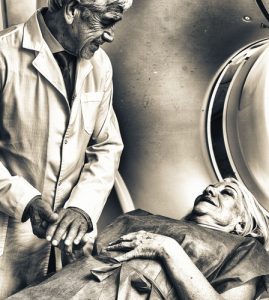Pastoral Thanatology is the study of pastoral care of the dying. It is a study but also a active ministry dedicated to the dying and applying the principles of care. Pastoral Thanatology deals with not only understanding the process of death but also helping individuals and families face death.

While it is a difficult reality to accept, one must eventually accept death. Death visits many people in different forms throughout their lives. Many experience death at a young age through the loss of a pet. Others may experience death all to commonly but the the reality that death occurs will manifest in one’s life. Those who seek to deny this and live in a world where death has no power are the most profoundly wounded when death strikes.
It is important to have a healthy respect for death. One does not need to have a morbid obsession with it but a healthy respect. A respect for the reality of death means one is not fearful to discuss it. One should not fear to discuss the death of oneself in the future or the death of a loved one. Many fear these discussions of death but by postponing these discussions they only make death worst when it does arrive.
Those who fear death are not prepared for death. Their Will is not in order, nor their future wishes. This leaves families without guidance after death. Others who refuse to discuss death with dying family members miss out on close and personal good byes that may not be able be said on the eve of death. Discussion of death is critical to a prepared death. One cannot allow a morbid fear of death and dying to complicate future issues.
It is hence important to understand the reality of death. It is important to know that when death is on the horizon not to dismiss it but to prepare for it. Many look to hospice to find relief. Some see hospice as a death sentence and refuse to utilize its services. This fear of death prevents important care to minimize pain and discomfort. Hospice is about quality of life. It looks care for terminal cases with 6 months or less to live. This does not mean one surrenders to death or gives up on life but instead one realistically is trying to limit symptoms. Shortness of breath, intense pain and other symptoms can be successfully dealt with by a hospice team. (1)
One can still have a medical team dedicated to treating the disease or looking to treat the disease itself but hospice will attempt to make the time more comforting. This is far from surrender but a realistic but also optimistic approach. Why should one live in discomfort? Instead minimize the symptoms of death and terminal disease while still looking for a cure. This is the proper mindset one should have in regards to the utilization of hospice.

A more acute form of care is Palliative Care. Palliative Care does not necessarily deal with oncoming and approaching death but is a special care unit designed to treat symptoms associated with a particular type of disease. They work with the primary caregivers and other healthcare team members in helping the person deal with the ongoing illness. Many units deal with cancer and other dangerous diseases. While both Palliative Care and Hospice deal with symptoms they do differ. Hospice deals with the dying while Palliative Care deals with those who are dealing with an onset of a disease that could possibly kill. (2)
Pastoral Caregivers, ministers, family and other care givers need to understand the phases of death. They need to recognize the reality of death and discuss it with individuals who are dying or with family members who are losing individuals to death. The care and counsel of a minister or caregiver certified and trained in Pastoral Thanaotology is important. The training helps ministers and family help the dying face death from an emotional and spiritual aspect.
The training in death and dying from a theological and philosophical standpoint help the counselor or minister better able to explain death and suffering from multiple cultural, social and religious views. They become equipped to answer questions and help emotionally guide the dying through death. With the combined understanding of the physiology of death, with this philosophical and theological training, a minister or caregiver can confidently help the dying and family.
Doctors, nurses and other primary caregivers should also be trained in Pastoral Thanatology. They need to be able to help their patient beyond just the physical but also treat them in mind and body. Many healthcare professionals lack a good bedside manner. This is unfortunate. With training in Pastoral Thanatology, healthcare providers can become better equipped in the care of the dying.
Elizabeth Kubler Ross was a pioneer in the care of the dying. Her study on the stages of death provided psychological chart for ministers and care givers in understanding the mindset of the dying. While this model is still useful, one must understand that reaction to death, or grief is not always ordered but these various emotions may come in any order. The classic stages include, denial, anger, bargaining, despair and acceptance. One can include many other emotions in the acceptance of death but these are the primary stages. (3)
Again it is imperative to emphasize that many individuals face these stages in various orders and not neatly put together steps. Some may even revert back to previous stages. So one certified in Pastoral Thanatology or ministers to the dying need to acknowledge that different patients react differently to death and need their own unique care.
Ultimately, death must be accepted. How we accept it, how we discuss it and how we deal with it throughout our life will determine our life. We need to be prepared for death and have a healthy acceptance for it.

The American Institute of Health Care Professionals and the American Academy of Grief Counseling acknowledges the need for good care to the dying and the families. AIHCP offers a certification for qualified professionals and clergy to be better equipped to help patients face death.
The program is online and independent study. Students can complete the required courses and then proceed to earn a four year certification in Pastoral Thanatology. The certification helps prepare ministers and other care givers the necessary training in Pastoral Thanatology. If you would like to learn more about care of the dying then please review our Pastoral Thanatology Program and see if it meets your academic and professional goals.
